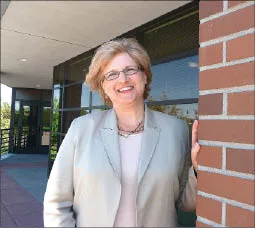Whitworth to offer courses at Riverpoint Campus this fall
School to start by teaching organizational management bachelor's degree program

Whitworth University plans to begin offering classes on the Riverpoint Campus east of downtown this fall.
Initially, the school will offer a business degree as well as some general-education courses, all targeted at non-traditional students who want to attend classes at night.
The business degree the university will offer is a bachelor's in organizational management in an accelerated format to students age 25 and older, along with enough general classes at Riverpoint to enable students to complete the four-year degree there, says Cheryl Vawter, Whitworth's director of administrative services for graduate and continuing studies.
"It's part of Whitworth's commitment to being downtown," Vawter says. "We want to be part of what's happening there," at Riverpoint and the University District.
Whitworth will lease space for a classroom on the second floor of the Sirti Building, at 665 N. Riverpoint, Vawter says. Professors will be drawn from the university's main North Side campus, at 300 W. Hawthorne, and from the community, she says, adding that the university also will schedule advisers and staff members to be at Riverpoint at certain times.
Whitworth is a private, Presbyterian-affiliated school with enrollment of 2,600 students in more than 50 undergraduate- and graduate-degree programs. The Riverpoint Campus is home to branch campuses of Washington State University and Eastern Washington University, as well as Sirti, a state economic-development-related agency.
Vawter says the organizational management degree is a good bachelor's degree for Whitworth to start its offerings with at Riverpoint.
"This program is a popular degree," she says. "It is the flagship in our accelerated-format degree program."
In the "accelerated format," students take one class during each six-week term, and meet one night a week plus two full Saturdays during the term, or two nights a week with no Saturday sessions. In contrast, semesters typically last about 14 weeks, and students generally take multiple classes at a time.
Each accelerated course a student completes is worth three credits, so if a student attends all eight six-week sessions offered by the school during the academic year, he or she would earn 24 credits for the year, attending just at night and possibly Saturday sessions. That's the equivalent of what a full-time student would earn in two semesters at Whitworth, she says.
The cost will be $430 per credit, which includes the cost of books and fees, Vawter says. The cost is less than what a traditional student pays because the school's cost of delivering the education at Riverpoint is less, she says.
Students with an associate's degree from a community college can transfer with a maximum of 64 semester credits, she says. Or students with no previous college can take a sequenced group of general-education courses typical of the first two years of college, all through the same accelerated program at Riverpoint, Vawter says.
With those general classes, all the classes required to complete a bachelor's degree in organizational management will be available through Whitworth at Riverpoint, she says.
The general-education courses will be offered on a rotating basis. Advisers will help students take such courses in the proper sequence, and students could finish those classes in about two years, she says. Some of the general-education courses include academic writing; study skills, a transition course for those who have been out of schools for a period of time; a history course; literature; a math course, called "Basic Concepts in Modern Mathematics," geared for those with anxiety about math; global issues; and others, she says.
After students complete the general-education classes, they start the organizational management degree program in what's called a "cohort" format, which means that a small group of no more than 20 students begin taking their major courses together, and then stay as a group through the sequence of degree courses.
Vawter says that because the cohorts, or student groups, stay together throughout the program, they will develop a stronger sense of community and collaborative learning, while instructors will build upon a knowledge base that increases with each successive course.
To start, Whitworth will offer one general-education class at Sirti during each six-week session and one organizational management class. Depending on demand, Whitworth might begin offering a third class there per session, she says.
In the future, Whitworth will look at market data to determine if and when to offer other degree programs at Riverpoint, Vawter says.
Related Articles

_c.webp?t=1763626051)
_web.webp?t=1764835652)

